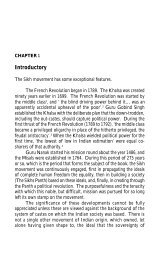The Sikh Turban: Post-911 Challenges to This Article of Faith
The Sikh Turban: Post-911 Challenges to This Article of Faith
The Sikh Turban: Post-911 Challenges to This Article of Faith
Create successful ePaper yourself
Turn your PDF publications into a flip-book with our unique Google optimized e-Paper software.
employer’s directives, Singh eventually and reluctantly agreed <strong>to</strong> wear a logo on his<br />
turban. 169<br />
<strong>The</strong> <strong>Sikh</strong> Coalition has filed suit on behalf <strong>of</strong> Singh. 170 <strong>The</strong> DOJ has also filed<br />
suit on behalf <strong>of</strong> Singh. <strong>The</strong> case is still pending as <strong>of</strong> February 2008.<br />
If the Jaggi and Rathour cases were precedential, should have a strong case<br />
against the MTA. It should be noted, however, that the Jaggi and Rathour resolutions<br />
were ultimately reached via settlement, not via judicial determination.<br />
What <strong>of</strong> the courts? Some legal scholars, including Circuit Judge Michael W.<br />
McConnell, have claimed that the courts have eviscerated religious rights in the<br />
workplace, 171 a situation that would ostensibly imperil turbaned <strong>Sikh</strong>s from bringing<br />
successful Title VII claims. For example, the Supreme Court has held that employers<br />
need not bear more than a de minimis cost <strong>to</strong> accommodate religious employees, 172 and<br />
that employers are not required <strong>to</strong> accept a particular accommodation suggested by the<br />
employee. 173 Courts have also allowed employers <strong>to</strong> defend themselves against undue<br />
hardship by claiming that the accommodation would negatively affect business<br />
operations, 174 impose on co-worker rights, 175 or endanger public health or safety. 176<br />
169 Id.<br />
170 See id.<br />
171 See Michael W. McConnell, Symposium, Religion in the Workplace: Proceedings <strong>of</strong><br />
the 2000 Annual Meeting <strong>of</strong> the Association <strong>of</strong> American Law Schools Section on Law<br />
and Religion, 4 EMPLOYEE RTS. & EMP. POL’Y J. 87, 98 (2000) (noting that “the Supreme<br />
Court’s decisions in Hardison and Philbrook have made mincemeat <strong>of</strong> the congressional<br />
intention in Title VII.”); see also Thomas D. Brier<strong>to</strong>n, “‘Reasonable Accommodation’”<br />
Under Title VII: Is it Reasonable <strong>to</strong> the Religious Employee, 42 CATH. LAW. 165, 182-<br />
186 (2002) (describing the ways in which the “[t]he courts have weakened reasonable<br />
accommodation rights in the workplace[.]”) [hereinafter Reasonable Accommodation].<br />
172 See TWA v. Hardison, 432 U.S. 63, 84 (1977) (“To require TWA <strong>to</strong> bear more than a<br />
de minimis cost in order <strong>to</strong> give Hardison Saturdays <strong>of</strong>f is an undue hardship.”).<br />
173 See Ansonia Bd. <strong>of</strong> Educ. v. Philbrook, 479 U.S. 60, 68 (1986) (“We find no basis in<br />
either the statute or its legislative his<strong>to</strong>ry for requiring an employer <strong>to</strong> choose any<br />
particular reasonable accommodation. By its very terms the statute directs that any<br />
reasonable accommodation by the employer is sufficient <strong>to</strong> meet its accommodation<br />
obligation.”).<br />
174 See EEOC v. Sambo’s <strong>of</strong> Ga. Inc., 530 F. Supp. 86, 91 (N.D.Ga. 1981) (disagreeing<br />
that “cus<strong>to</strong>mer preference is an insufficient justification or defense as a matter <strong>of</strong> law[.]”).<br />
175 See Weber v. Roadway Express Inc., 199 F.3d 270, 274 (5th Cir. 2000) (finding that<br />
an accommodation is “more than a de minimis expense because [it] unduly burdens his<br />
co-workers.”).<br />
31
















